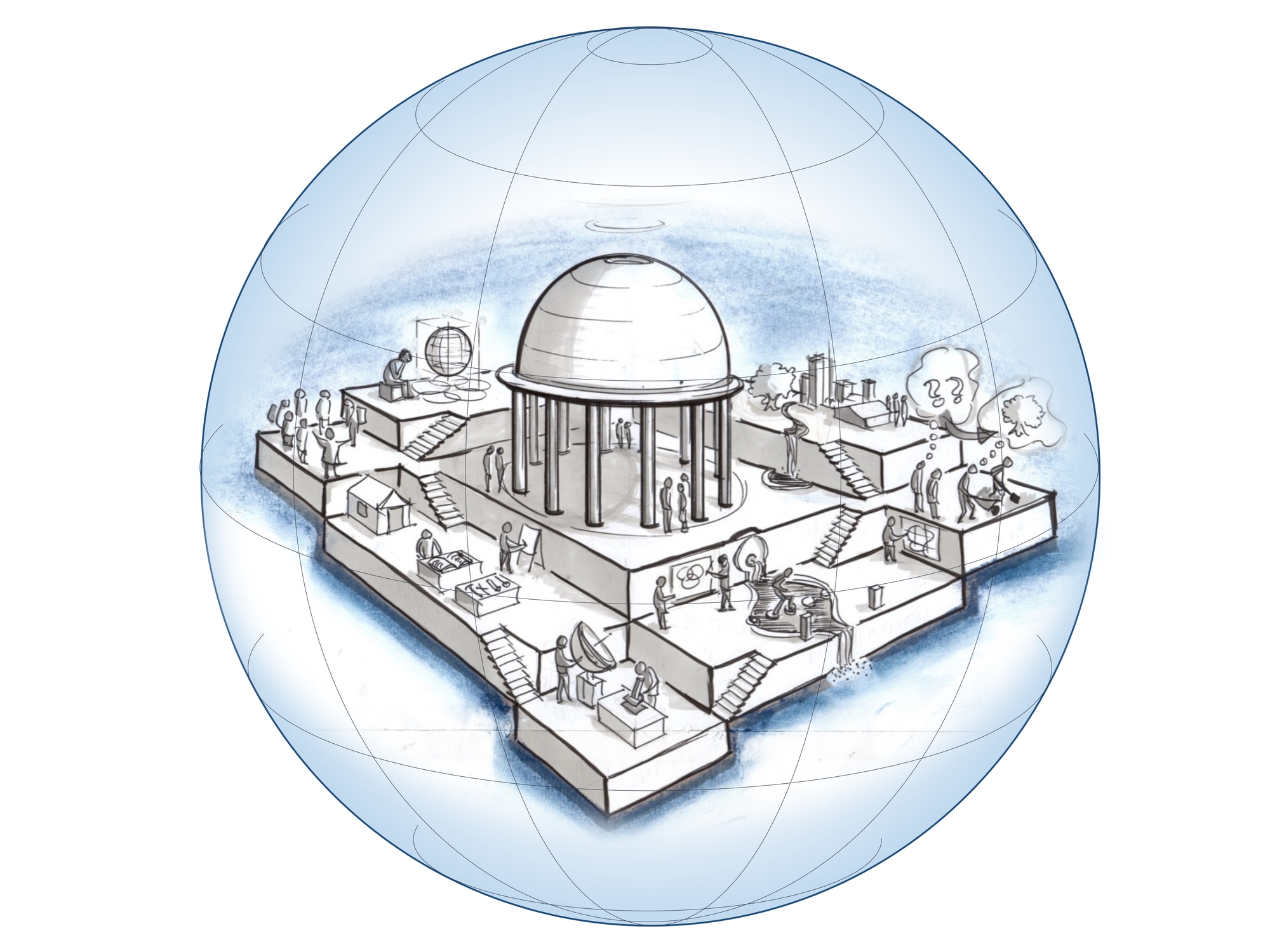Collaboratorium – how it works
(a.k.a. Laboratory for collective intelligence / Future-wise Mind-Lab:
This Collaboratorium or Future-wise Mind-Lab is an international online ‘Laboratory for collective intelligence’.
We aim to develop and test new kinds of systems based on collective intelligence: and pathways for transformation towards such systems.
In 2021 we are working on three main themes, each with several topics:
- Eco-wise: bio-regional, peri-eco-urban, green new deal, and the ‘collective climatic intelligence’;
- Smart-wise: cities, localities, governance and the ‘CHAI’ (Collective Human-Artificial Intelligence);
- Fore-wise: foresight cities, communities, ‘pandemonics’, and the ‘collective policy intelligence’;
The first cartoon here shows a ‘Deeper Mind Lab’ – a future-fiction version. In a similar way we have various pilots going on in a large experimental zone – various people walk around, debate progress & insights, or design the pathways which follow… The second graphic shows a Mind-Lab as part of a ‘multi-versity’ – a city or community where everyone learns with & from everyone…
The Mind-lab is linked to the Future-wise Cities theme at the Manchester Urban Institute (https://www.mui.manchester.ac.uk/research/themes/future-proof-cities/ ).
We would like to acknowledge the financial support from the ISSEK (Institute of Statistical Studies for the Economics of Knowledge), at the Higher School of Economics, National Research University, Moscow, www.issek.hse.ru/.
For more see the Future-wise Mind Lab – update – October 2021
For updates and background see the Future-wise conversations/
HOW IT WORKS
For each theme we set up an online ‘experimental zone’. This includes –
- Pilot projects & case studies (from participants & speakers), both ‘what-if’ and actual;
- Each pilot aims to explore pathways towards a collective intelligence;
- In the workshop we start with the presentations and questions raised
- Then we tour around the experimental zone, with questions & critiques, ideas & connections.
- We focus on 1-2 case studies for active debate & development (more can be done with subgroups if needed);
- Each pilot project gathers over time a community of interest, for further research, funding and/or publication: for the whole theme we plan a ‘white paper’ & special issue in 2022.
For each theme and its various pilots / experiments, we invite:
- Contributions from speakers;
- a wider community of interest with potential co-authors
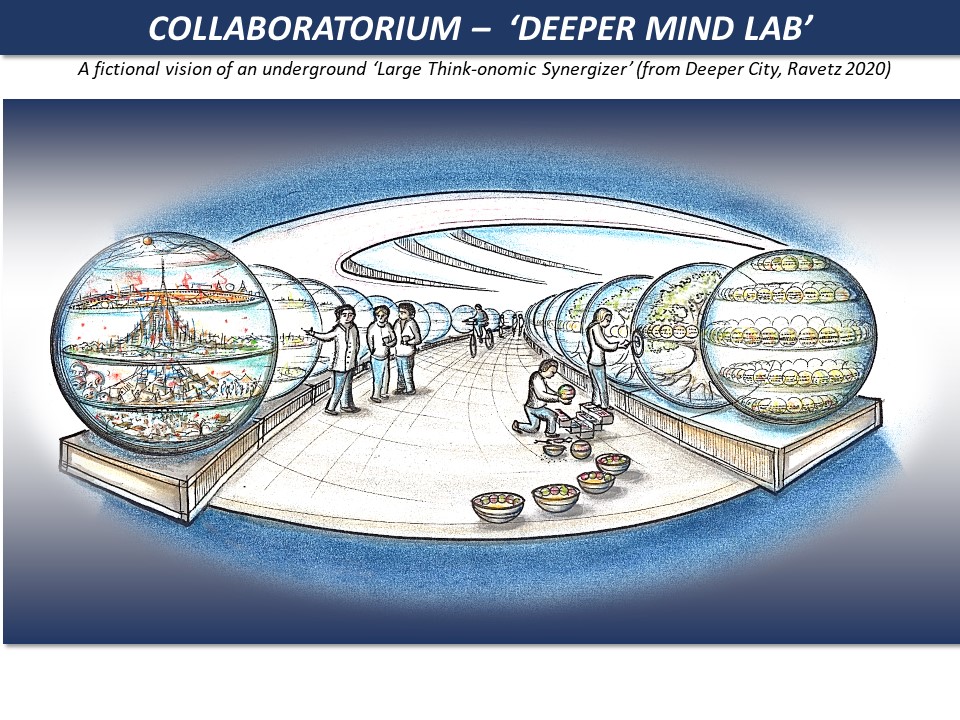
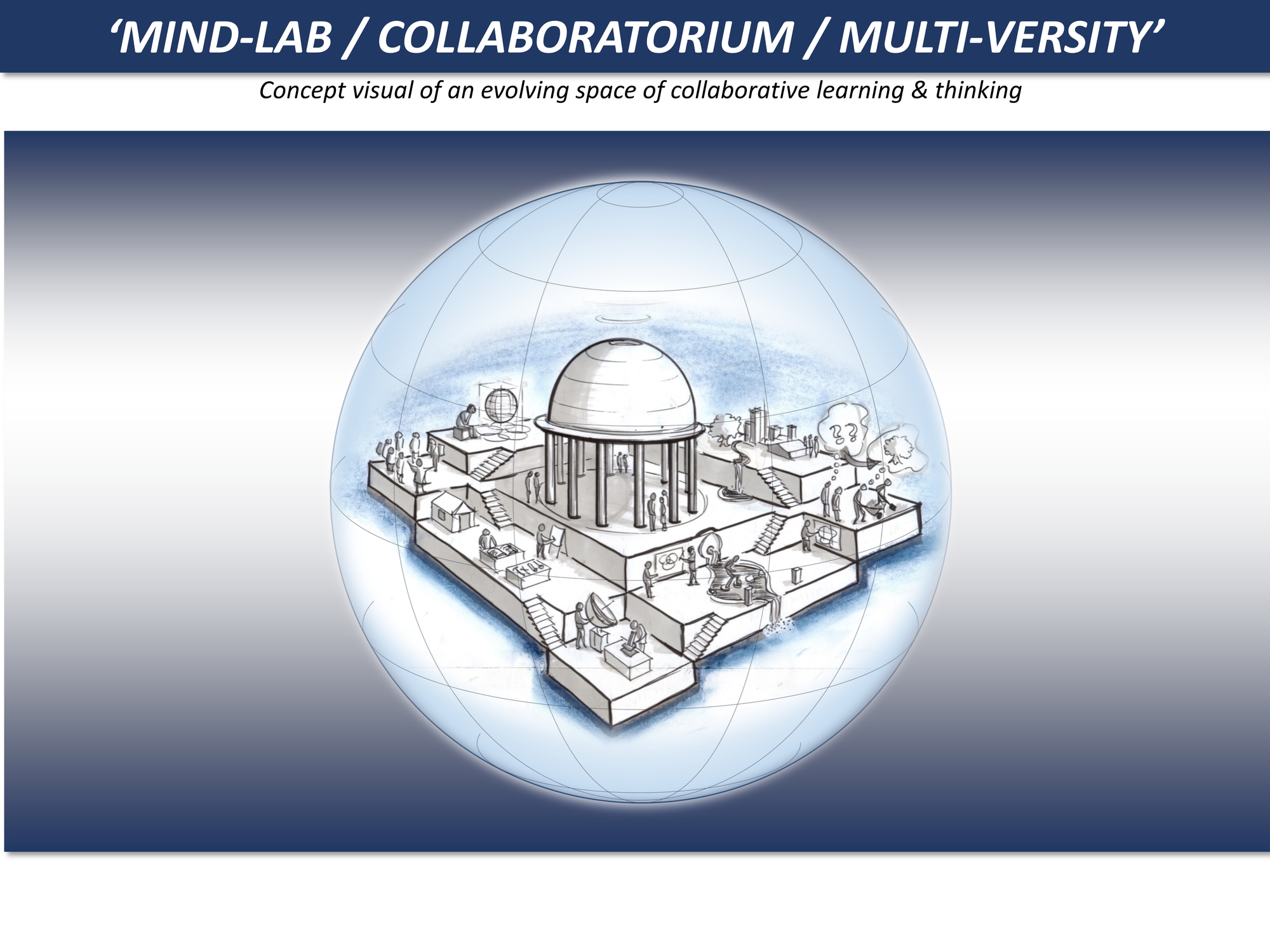
For each pilot / experiment we explore some over-arching questions:
- What is the scope of the problem / challenge here? (i.e. ‘system mapping’)
- How would a collective intelligence look & work on the ground? (‘synergy mapping’)
- Which pathways could lead towards such collective intelligence? (‘strategy mapping’)
- What other pilot experiments could be set up?
For the outputs, we aim towards –
- academic papers in a special issue
- online comment / ‘white papers’ / co-authored book
In the online workspace shown here, each pilot experiment has a zone with relevant materials (maps, tables, visuals, links etc), and templates to help the mapping process. Visual thinking is a major part of a transition to holistic or ‘whole-system’ thinking.
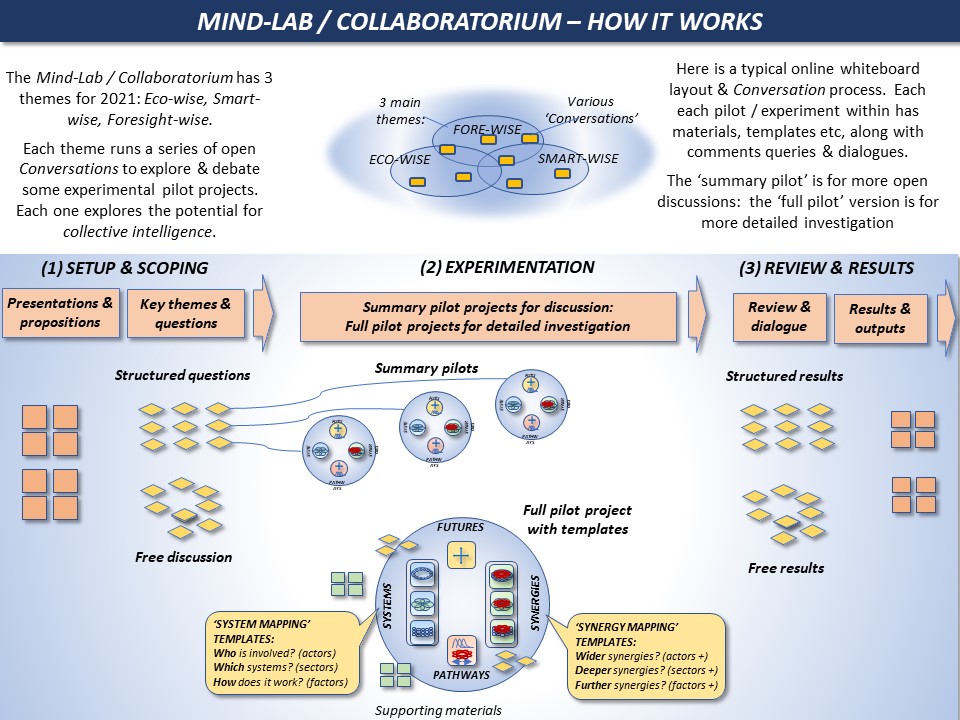
The online whiteboard is very useful as an interactive workspace. We use a common set of templates (so-called ‘synergistic model canvas’), and others can be added when needed. Slides or documents can be loaded and comments made on sticky notes: (these can be colour coded, e.g. yellow=normal comment: green=idea: red=disagreement: purple=question, etc).
Each Conversation uses our unique ‘1-2-3’ online combination: ‘1D’ discussion platform, 2D whiteboard, and 3D virtual gallery / garden space (shown here), for coffee, viewings and general discussion.
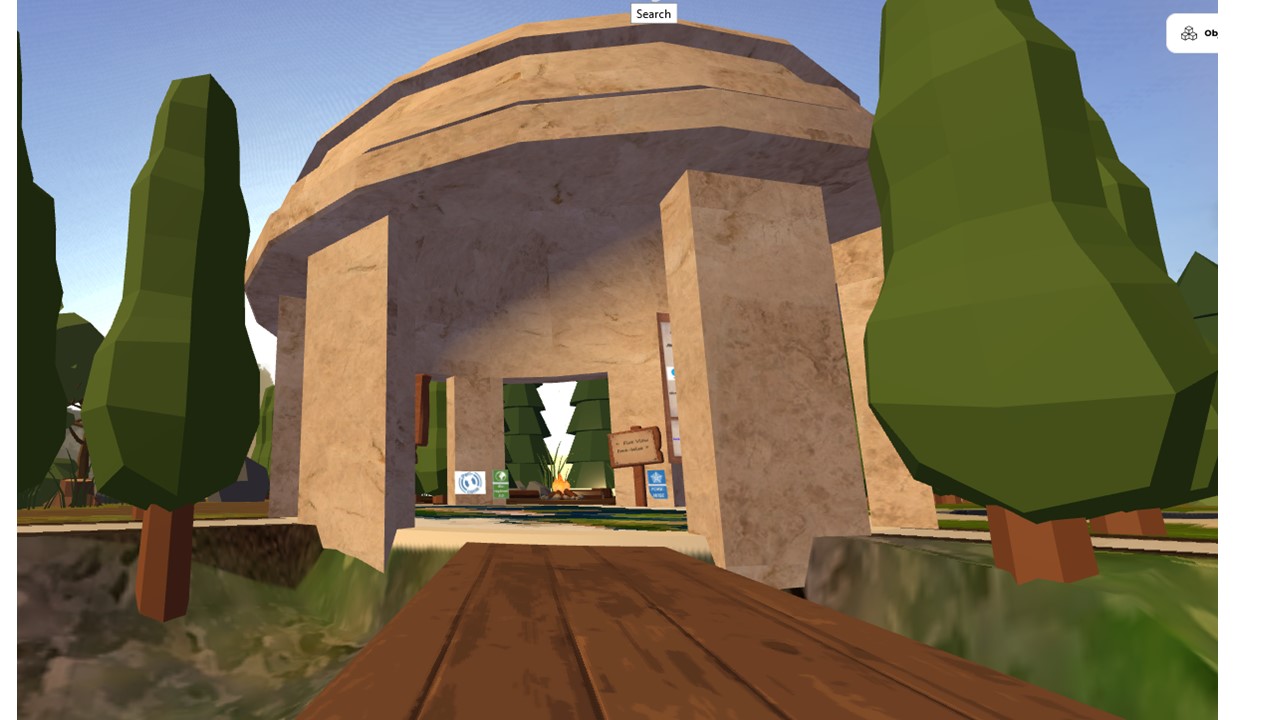
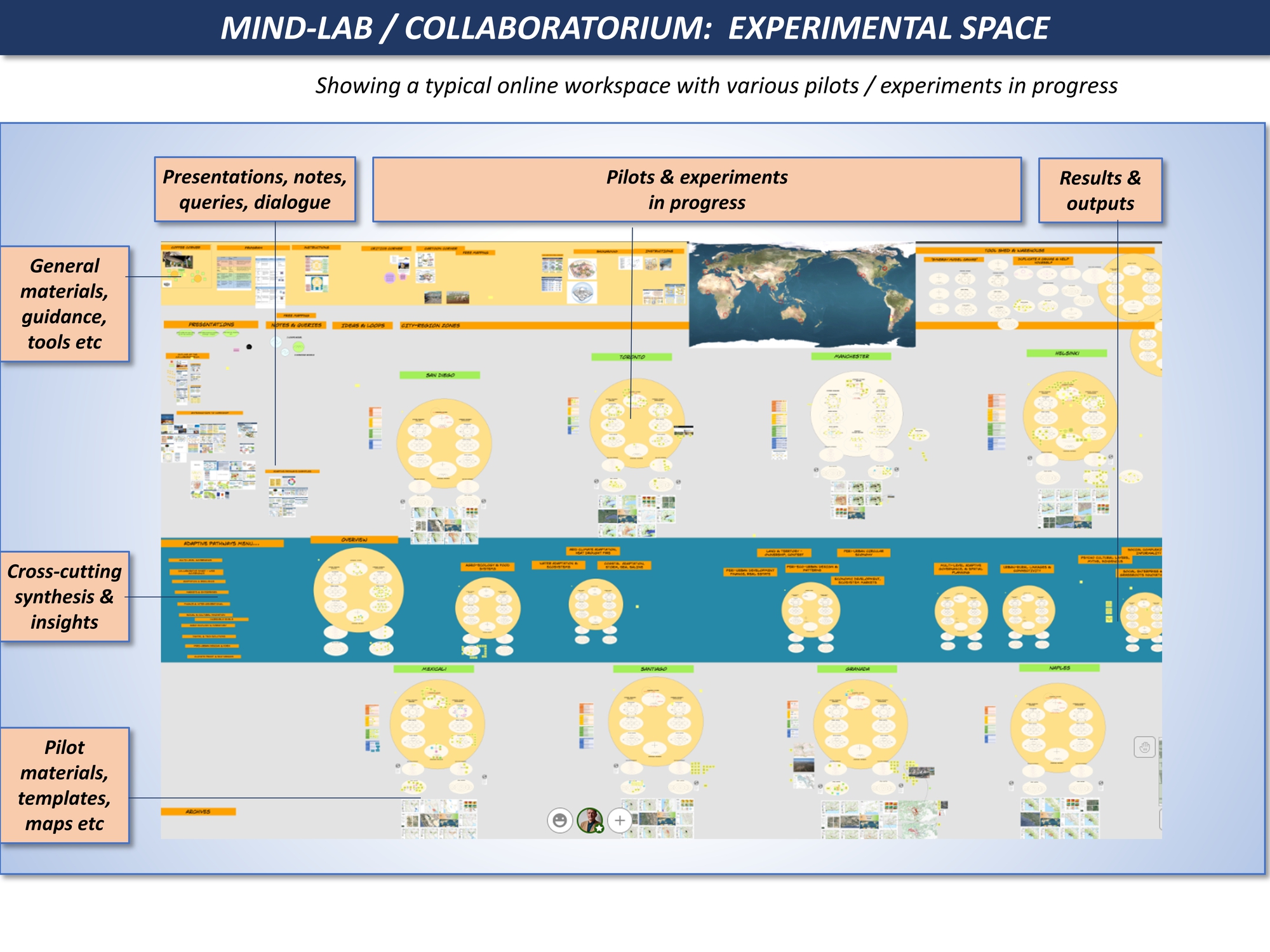
WHO IS INVOLVED
As of mid 2021 the Mind-Lab has emerged as a viable concept, with so far around 250 participants, in 15 major meetings, covering 8 main topics. People are invited to join as –
- Community: an open ‘community of interest’ with potential co-authors.
- Guest speakers with special contributions.
The Mind-Lab as of 2021 is a self-organized network within the Manchester Urban Institute. When the first round is complete, we aim at further funding to set up (if needed) as a free-standing operation.
(The graphic here shows a process in 4 stages, in real-time meeting room, as the inspiration for the online version).
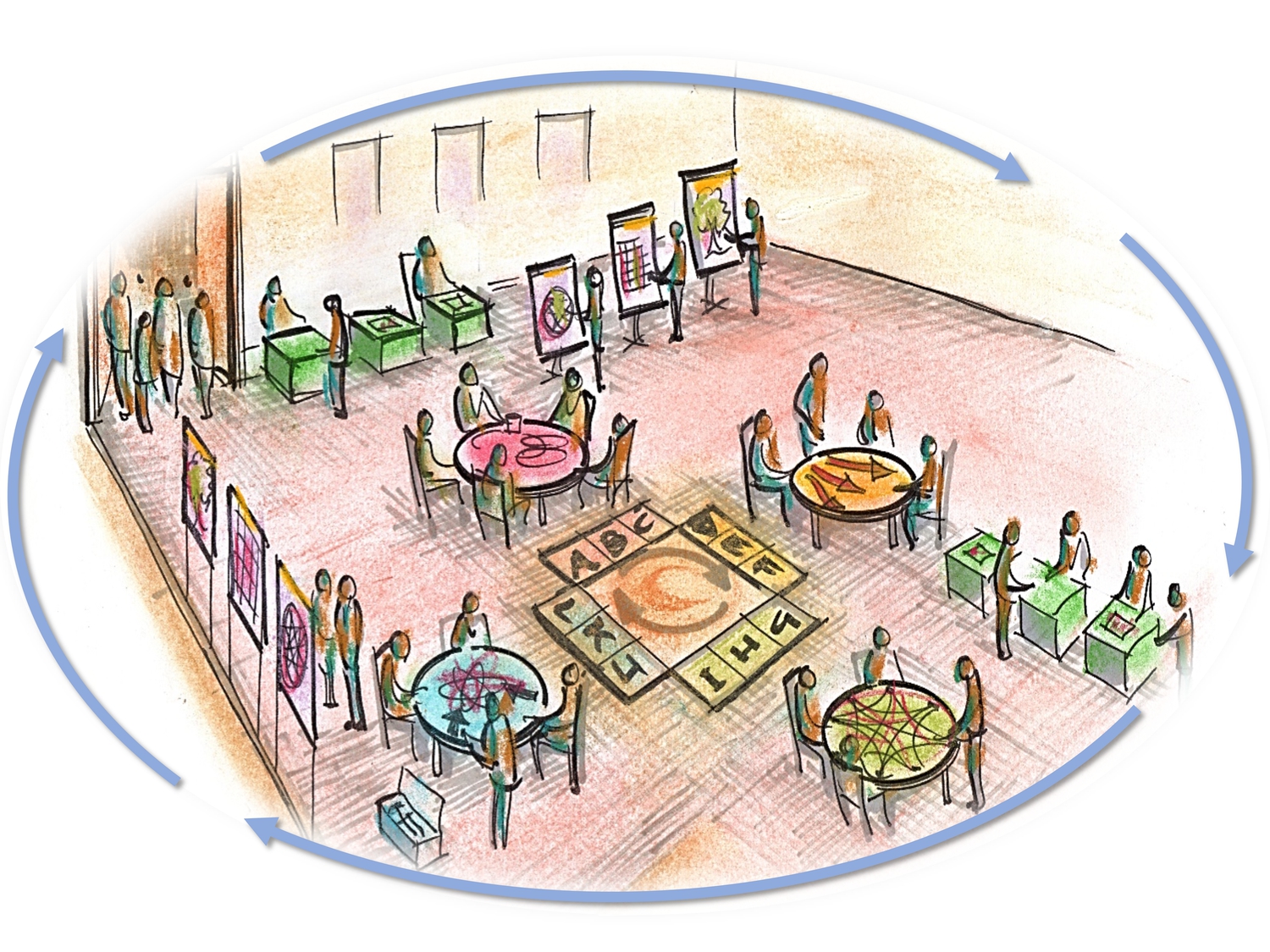
What lies behind
The methods and tools used here draw on the new book Deeper-City : Collective-Intelligence-and-the-Pathways-from-Smart-to-Wise.
This set out the general scope of a Mind-Lab / Collaboratorium:
- Wider synergies between actors:
- Further synergies between factors:
- Deeper synergies of layers / domains:
- Co-evolutionary synergies for transformation, towards a ‘3.0’ level of ‘collective intelligence’
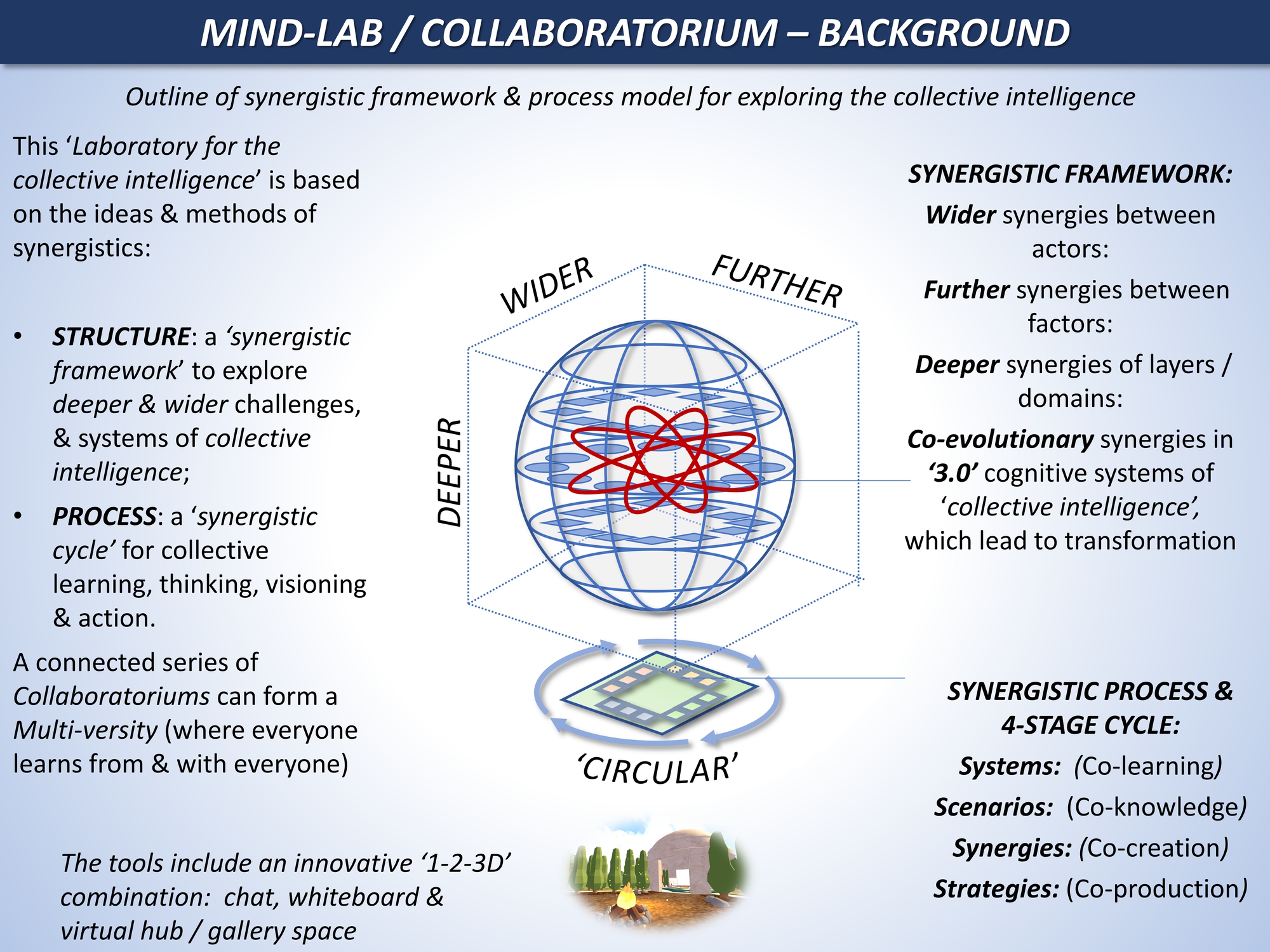
What are the results
Overall each theme, and each pilot / experiment within it, aims for results both practical and transformative:
- R&D on concept models for collective intelligence
- Recommendations for pathways
- Proposals for further research & next steps.
Why do this?
We see multiple overlapping global challenges ahead – climate change, artificial intelligence, political extremism, to name a few. In each it’s clear we need to look beyond short term problems, towards the potential for transformation – and this calls for an emerging collective intelligence, with deeper layers of value: social, technical, economic, ecological, political, cultural, and so on.
The book Deeper-City-Collective-Intelligence-and-the-Pathways-from-Smart-to-Wise demonstrates the mappings of 40 such pathways. The Collaboratorium aims to take them forward into practice, by development and testing with a wider global community. The pandemic 2020-21 is a challenge, but also has mobilized a shift to online tools, well suited to international collaboration.
Overall the Collaboratorium is itself an experiment, to see how far a global community can work together on challenges of common interest.
Some background
Here is some of the thinking behind the Conversations, with a sketch of the Collaboratorium or ‘Laboratory for the collective urban intelligence’, which lies behind this program (notes based on Chapter 10 of the Deeper City).
In the background is an existential challenge – MADDER (‘Mutual Assured Destruction and Denial of Ecosystems & Resources’) – a deeper threat multiplier of global proportions. Here the economists point to market failure, engineers to technology lock-in and policy-makers point to double-binds, in the desperate search for solutions that work. The world certainly needs ‘hard-hat’ low carbon energy, transport or housing – but it needs as much or more, the ‘human infrastructure’ of collaboration and capacity for learning and thinking ahead. And these two sides are highly inter-connected. We’re now inside our own experiment, a global laboratory of geo-bio-chemical systems, but also a laboratory of human collaboration. And this global scale lab experiment is based on countless local Labs, each with innovations and prototypes, experimentation and learning, dialogue and collaboration.
This is a moving picture, as every day there are new technologies or social innovations, but here are some basic options for such Labs:
- Mind-Lab, to explore the system and problem, with general challenges and debates;
- Scenario-Lab, with a focus on the future;
- Synergy-Lab, for the vision and potential for co-evolution;
- Strategy-Lab, more about practical pathways, plans and projects.
Each of these can be a one-off debate or enquiry or pathway design session. But for deeper and wider challenges, all these are needed in combination, and then we have a longer programme, a Collaboratorium, i.e. ‘Laboratory for Collaboration’.
The current wave includes city-labs, policy-labs, future-labs, think-labs and Mind-Labs: going under various names – big tents, sand-pits or idea-pools. Some are keen on ‘workshops’ – so we do ‘walk-shops’ (out in the landscape), ‘talk-shops’ (speaks for itself), ‘cook-shops’ (long lunches), ‘draw-shops’ (for visual thinkers) or ‘dream-shops’ (calling on the subconscious). Behind this is a long history of places for gathering and interchange: forums, agoras, marketplaces, assemblies, rallies, think-tanks, trust circles, away-days or symposia (meaning ‘drinking together’…). But too often such meetings fall short of expectations: the agenda is hijacked, participants stay in silos, key persons are missing, time is too short, problems are ill-defined, discussion goes in circles…. So it’s crucial to keep in view the principles of a collective deliberative intelligence, and the tools which can mobilize it.
With an inter-connected series of Labs, a Collaboratorium can begin to explore the synergistic potential. We can gather the wherewithal – a learning community, resources, methods and tools, and pathways towards action. We can investigate the deeper synergies between layers and domains, wider synergies between actors and further synergies between causes and effects. Then we can map the various Modes, or levels of complexity – Mode-I functional synergies, Mode-II evolutionary (‘smart’), and Mode-III co-evolutionary synergies (‘wise’, or at least ‘wiser’).
And so, for the practical example of a Low-Carb City:
- A Mind-Lab brings people together to explore the problem (local energy vs global climate): a Scenario-Lab explores the future (climate change vs social change?). Then a Synergy-Lab creates the vision (maybe a Green new deal 3.0?): and a Strategy-Lab focuses on the action plan, for business, communities, government, researchers and so on.
- A Low-Carb Collaboratorium continues with a longer programme, covering multiple sectors, technologies or policies: for energy, transport, housing, business, ecosystems, circular economy and more…
- Overall a series of Collaboratoria may then form an integrated Multi-versity. This is basically a community or network or collaborative cluster, larger or smaller, where everyone can learn with, by and from everyone. Different versions of similar concepts can be seen emerging here and there…
